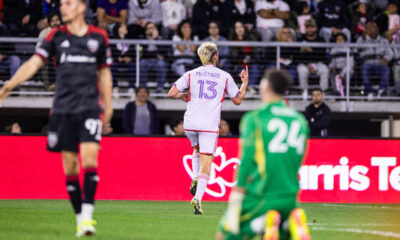Orlando City
Orlando City vs. Montreal Impact, Preseason: Five Takeaways
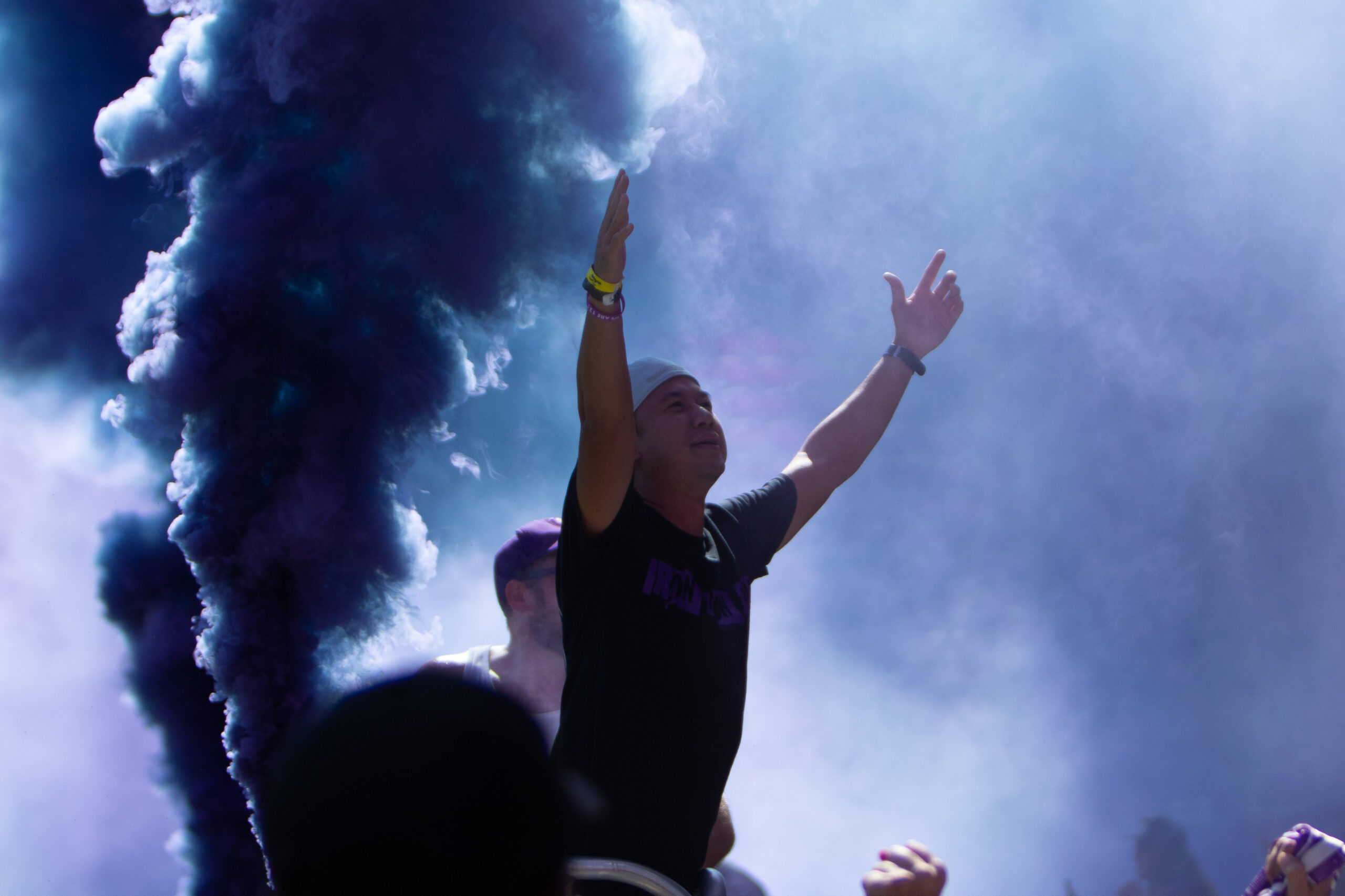
Orlando City “got the dub” (as Benji Michel put it) on Saturday night against the Montreal Impact at Exploria Stadium in the team’s first public display under Oscar Pareja. While it would be foolish to try to make any assumptions about the team from one preseason game that likely lacked any game-planning or film study of any kind, there were some things on display in the Lions’ 1-0 victory that are worthy of discussion.
Here are some of the things that stood out to me from Saturday’s preseason win:
Formation is Fluid
It’s common for a formation to look different when the team has the ball vs. when the opponent has it, but it was clear on Saturday that fluidity is part of the system Oscar Pareja has brought to Orlando. The gaffer took advantage of Ruan’s speed and attacking prowess against Montreal and when the Lions had the ball, the back line was a three-man look for the most part, with Kamal Miller, Rodrigo Schlegel, and Antonio Carlos holding down the fort. Michel, who played mostly in an outside forward role on the right last year, was deeper on the field on the left side and the second-year Homegrown Player served in sort of a left wingback role to mirror what Ruan was doing on the right. The highest trio of players — Nani, Dom Dwyer, and Mauricio Pereyra — swapped positions on the field often, weaving together with short, quick passes in the final third.
The chemistry needs a little more work and time to completely come together, and the players still need to anticipate switching play when deep runners get open, but if (or when) things start to click, the attack will have a lot more teeth in it, as forwards and midfielders alike will start to pop in behind the defense.
“We’ll just keep going, keep building,” Pareja said of his team after Saturday’s game. “We just have 21, 22 (training) sessions and most of those have been with the fitness content, so we’ll keep building slowly. It’s a long journey.”
Athleticism on the Back Line
Carlos, Schlegel, and Miller are all quite mobile and agile and did well for the most part on defense. Ruan will always cheat forward and then use his speed to recover and track back, which he did on Saturday and was mostly successful at it with the exception of a couple of overly casual giveaways once he’d won the ball. Miller also had some dangerous giveaways on the left, so perhaps they just need more time in the system to clean that up. The center backs seem to have good movement, looked good in the air, and considering how little time they’ve spent together, they appeared to have some chemistry already. Robin Jansson was a great find last year, but his movement doesn’t compare favorably to that of Schlegel or Carlos. I would think Carlos is a favorite to be a first-team choice so it’s nice to know that if his partner ends up being Schlegel or Jansson, it provides a good depth player either way.
Pedro Gallese Looks the Part
He wasn’t called into action that often, but Gallese appeared to be the real deal in his first public outing for Orlando City. He made a couple of big saves but mainly what was impressive was his positioning and ability to read the play. The Peruvian international had command of his box and said he is already building chemistry with the defenders in front of him.
“The communication between me and Rodrigo and Antonio and the entire team is really good,” Gallese said through an interpreter. “I think it’s very important for us to get to know each other as a group, because that’s going to help us to build more confidence.
El Pulpo should be fun to watch this season but if the lack of chances Montreal generated is a sign of things to come (aside from when the Impact threw numbers forward late in the game against several substitutes in the midfield and at right back), it’ll be nice if his teammates don’t give him too much to do.
Emphasis on Movement
One thing that stuck out on Saturday in the tactics department was how quickly the Lions moved the ball. There was a lot of one-touch passing, particularly in the attacking third, and the ball was constantly on the move. It looked quite different from the way Orlando probed the perimeter last season.
“I wouldn’t say one-touch, but (Pareja says to) keep it simple and move the ball fast,” Michel said after Saturday’s game of the teams mindset in possession. “Just keeping the play as simple as possible.”
There will be some turnovers until the players become more attuned to where their teammates will be and where they like to receive the ball — Nani in particular had some ball security issues on Saturday — but Orlando can be a lot better in terms of possession in 2020 once that gets ironed out. Montreal did a good job of pressing in the midfield and anticipating shorter passes, so the Lions will need to vary their attack and take advantage of overly aggressive pressure to get the ball in behind.
Ball Winners Win Balls
Junior Urso and Uri Rosell were quick to pressure after turnovers to win the ball back and prevent Montreal’s counter from getting going most of the night. Orji Okwonkwo had one or two opportunities, and Miller did need to make a tactical foul to break up one counter after a Nani turnover, but for the most part the central midfielders did a good job of slowing down the Impact’s ability to transition or forcing things wide with the help of Carlos and Schlegel so that Ruan and Miller had time to track back to slow things down. Players like Michel and Pereyra were also able to quickly drop and help funnel Montreal’s possession out wide or to force the Impact to play balls backward. It’s only one game, and it’s unclear how good Montreal’s attack will be, but it was an encouraging sign that the Lions may be able to build on last year’s progress in developing as a defensive unit.
Those are the primary things I noticed on Saturday. I’m not overly concerned about the lack of chance creation as Montreal played a well-organized match and there was no real game-planning involved. Now that the fitness-building portion of preseason training is giving way to more emphasis on tactics and style of play, the chemistry and sharpness should improve. The Lions were inches from breaking in on goal several times but a defensive toe in the way, a ball slightly behind, or a bounce at just the wrong time prevented forwards from getting in 1-v-1 on Evan Bush on multiple occasions.
For those of you who turned out for the match, what stood out to you? Let us know in the comments below.
Lion Links
Lion Links: 5/1/24
Mason Stajduhar was arrested, Orlando Pride play at home tonight, Colin Guske discusses his signing, and more.

Welcome to Wednesday and welcome to May, Mane Landers. It’s that time of the week for your tasty links. Don’t forget that the undefeated Orlando Pride are in action tonight, so check back for our match preview and the latest episode of SkoPurp Soccer: An Orlando Pride PawedCast for additional pre-match coverage. In the meantime, let’s get to the links.
Mason Stajduhar Arrested This Past Weekend
Orlando City goalkeeper Mason Stajduhar and his wife Tatiana Stajduhar were both arrested on disorderly conduct charges following an incident at a nightclub on Sunday. The couple were reportedly disrespectful to the club’s staff and got into an altercation with the security guards. Mason stated he was only resisting the security guards to re-enter the club because the bouncers allegedly hit his wife. Tatiana allegedly pushed the police officers after they arrived, and she was not charged with battery on a law enforcement officer. The couple were released Monday after posting a bond. Orlando City provided the following statement to WESH 2 News:
“The Club is aware that goalkeeper Mason Stajduhar was arrested early Sunday morning. We are currently gathering more information and will have no further comment at this time.”
Orlando Pride Host the North Carolina Courage Tonight
After a 3-2 win on the road last Friday against the Washington Spirit, the Orlando Pride are back in the City Beautiful and will take on the North Carolina Courage tonight. Unbeaten in their six games so far this season, the Pride have also won their past three games and sit fourth in the standings. They’re tied on points with a Courage team that beat the Seattle Reign this past weekend. Orlando has scored at least one goal in every match this season. Forward Barbra Banda had a great performance in that win against the Spirit, so hopefully the scoring trend continues tonight for the Pride.
Orlando City and Orlando Pride Awarded
Have you enjoyed the new food options at the stadium? I know I have, and I’m looking forward to trying even more. The efforts made by Orlando City’s front office to feature more local food and beverage options did not go unnoticed, as the club won the Hospitality & Dining category in the Downtown Orlando Partnership’s 2023 Golden Brick Awards. The Orlando Pride’s 2023 Highway Woman Kit also won the award in the Arts & Culture category. The home jersey was inspired by the work of Mary Ann Carroll, the sole woman in the famed Highwaymen artists from decades ago.
Colin Guske Speaks On Signing First Pro Contract
Orlando City academy player Colin Guske signed his first professional contract with the club last month and spoke on the importance of this moment in his career. The 17-year-old is now on a MLS NEXT Pro contract with Orlando City B, and he has started in nearly every game for the Young Lions this year. Both of Guske’s brothers have also played for Orlando City’s academy over the years and he thanked his family for helping him reach this point.
“It’s awesome to represent the Guskes,” Colin said. “Thanks to my brothers for always pushing me through early mornings and late nights, always putting in the work, doing video sessions, everything. My sister as well, for always being there for me and my parents, too. They’re always helping me and what was the best for me.”
Free Kicks
- Enjoy all of the sights and sounds from the Pride’s big win over the Spirit in the nation’s capital.
- Spirit defender Anna Heilferty will miss the remainder of the season after suffering an ACL injury in the team’s loss to the Pride.
- American forward Haji Wright scored his 19th goal across all competitions in Coventry City’s 2-1 loss to Ipswich Town. He will have a chance to make it 20 when Coventry hosts Queens Park Rangers on Saturday.
- The Champions League semifinals are underway and Real Madrid and Bayern Munich played to a 2-2 draw in Germany. The second leg will take place on May 8 in Madrid.
That will do it for today. If you can make it out to the stadium tonight to catch the Pride in action, I strongly suggest you do so. Barbra Banda is about to take the NWSL by storm and you’ll want to see it in person. Vamos Orlando!
Orlando City
Orlando City vs. Toronto FC: Player Grades and Man of the Match
How did your favorite Lions perform in Orlando City’s home loss to Toronto FC?
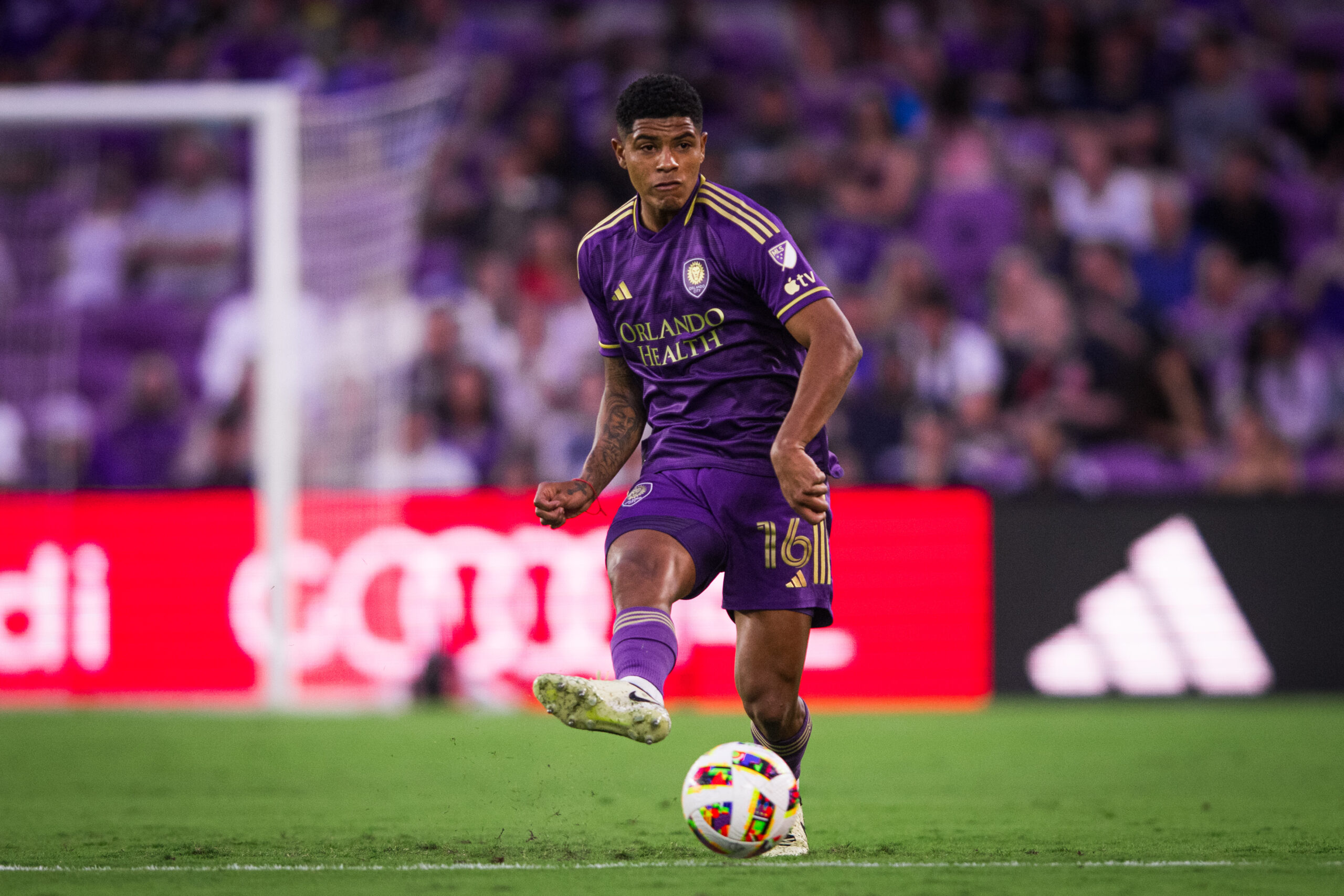
Orlando City was on its way to three points Saturday night before a late collapse saw the Lions lose 2-1 to Toronto FC at home. It’s a tough loss in a season that has seen an unexpected start with the Lions sitting near the bottom of the Eastern Conference.
Here’s how I saw the individual performances for the Lions in this difficult loss.
Starters
GK, Pedro Gallese, 5.5 — Gallese’s form has definitely dropped this year, though he was one of the best goalkeepers in the league over the past four seasons. He was solid for the first 87 minutes, saving the two shots he faced, but then the wheels came off for the Lions. Toronto scored two goals when defenders left players wide open in the box. Gallese probably could’ve done better with Prince Owusu’s winner, but there was a difficult change of direction on the bounce, and the forward should’ve had somebody on him. Apart from his goalkeeping, Gallese completed 61.9% of his 21 passes, including seven of his 15 long balls, and recorded a clearance.
D, Rafael Santos, 6 — Santos had a solid game against Toronto. His 62 touches were the fourth-most on the team and he completed 90.7% of his 43 passes. The starting left back didn’t complete his lone cross but connected on two of his four long balls. He had a shot of his own, putting it on target. Defensively, Santos recorded a tackle, interception, and clearance before being replaced by Kyle Smith in the 71st minute.
D, David Brekalo, N/A — Brekalo had a short night as he was injured early in the game. In the fourth minute, he collided with Owusu and required treatment for his knee. The center back attempted to continue, but eventually had to come off in the 16th minute, replaced by Rodrigo Schlegel. He only had 12 touches in the game and completed 90.9% of his 11 passes. The only defensive stat he recorded was winning an aerial duel. He wasn’t on the field long enough to fairly give him a grade.
D, Robin Jansson, 6 — Jansson was terrific for most of this game. He recorded a team-high 88 touches and completed 84% of his team-high 75 passes, which included six of 13 long balls. His excellent ball forward for Facundo Torres in the 37th minute led to the Lions’ goal. Defensively, he led the team with three tackles, three clearances, two blocked shots, and two aerial duels won.
D, Dagur Dan Thorhallsson, 5.5 — Thorhallsson took his regular spot at right back and recorded 53 touches on the night. He completed 88.6% of his 35 passes, but didn’t connect on either of his two crosses or three long balls. He took a shot in the game, but it was off target. Defensively, he added a tackle, a blocked shot, and a successful aerial duel. Unfortunately, his most impactful part of the game was failing to cover Owusu at the back post, leaving the forward wide open to head in the game-winning goal.
MF, Cesar Araujo, 6 — Araujo had a solid performance against Toronto, recording 61 touches. He completed 83.7% of his 49 passes, including three of his six long balls and his lone through ball. Defensively, he added a team-high three tackles, an interception, a blocked shot, and an aerial duel won.
MF, Wilder Cartagena, 6.5 — Cartagena had one of his better games in this one, recording the second-most touches on the team with 71. He completed 88.7% of his 62 passes, including two of his three long balls. Defensively, he added a team-high three tackles, a clearance, and won an aerial duel, while taking one off-target shot.
MF, Ivan Angulo, 6 — Angulo had 51 touches against Toronto and completed 91.7% of his 36 passes. He completed one of his two long balls, but didn’t connect on his only cross attempt. His lone shot was off target, and he helped defensively by intercepting a team-high two opposition passes.
MF, Facundo Torres, 6.5 (MotM) — Torres had an excellent performance in this game, recording 51 touches. While he only completed 75% of his 32 passes, he connected on two of his three crosses and played a perfect ball for Duncan McGuire in the 37th minute, enabling him to tap home the opening goal. The attacking midfielder nearly got one for himself in the 73rd minute from distance, forcing Sean Johnson into a good save. Similar to Angulo, Torres helped out defensively with two tackles and an interception.
MF, Martin Ojeda, 6 — Ojeda had 36 touches in 60 minutes and completed 92.3% of his 26 passes. He connected on one of his two long balls, but neither of his two crosses. He took one shot in the game, but failed to hit the target before being replaced by Nico Lodeiro.
F, Duncan McGuire, 6 — McGuire scored the Lions’ lone goal in this game and was nearly the outright hero. He touched the ball 22 times and completed 63.4% of his 14 passes. However, strikers are judged on goals and McGuire scored the opener when he got on the end of Torres’ cross in the 37th minute. He nearly had a second in first-half stoppage time when he brought down an Ojeda cross well and slammed it into the far side netting. Unfortunately, he was just offside. He was replaced by Luis Muriel in the 71st minute.
Substitutes
D, Rodrigo Schlegel (16’), 6.5 — Schlegel came on in the 16th minute when Brekalo went off injured and, despite not expecting to play that many minutes, was very good. His 71 touches were tied for the second most on the team and he completed 88.1% of his 59 passes, including two of his four long balls. Defensively, he had a team-high three tackles, an interception, and a team-high six clearances.
MF, Nico Lodeiro (60’), 6 — Lodeiro came on for Ojeda in the 60th minute and recorded 31 touches in a half hour of action. He completed 76.5% of his 17 passes, including a key pass and both long balls, but none of his three crosses. He also had a tackle defensively and didn’t take any shots.
D, Kyle Smith (71’), 5.5 — Smith came on in the 71st minute to help see out the game, replacing Santos. He touched the ball 19 times and completed 88.9% of his nine passes, including a key pass, his only cross, and his only long ball. The purpose of his inclusion was to help defensively and he recorded three tackles, an interception, and a clearance. However, he allowed clean crosses on both late Toronto goals and struggled to track Kobe Franklin and Federico Bernardeschi on Orlando’s left flank.
F, Luis Muriel (71’), 6 — Muriel came on for McGuire in the 71st minute, playing a deeper role. He recorded 21 touches and completed 64.3% of his 14 passes, including a key pass. He had two tackles defensively, but didn’t take any shots in 19 minutes of action.
That’s how I saw the performances for Orlando City in its 2-1 loss to Toronto FC Saturday night. Let us know how you saw the game and vote on your Man of the Match below.
Lion Links
Lion Links: 4/30/24
Luana’s season ends with Hodgkins Lymphoma diagnosis, San Diego linked with Chucky Lozano, U.S. and Mexico withdraw 2027 World Cup bid, and more.
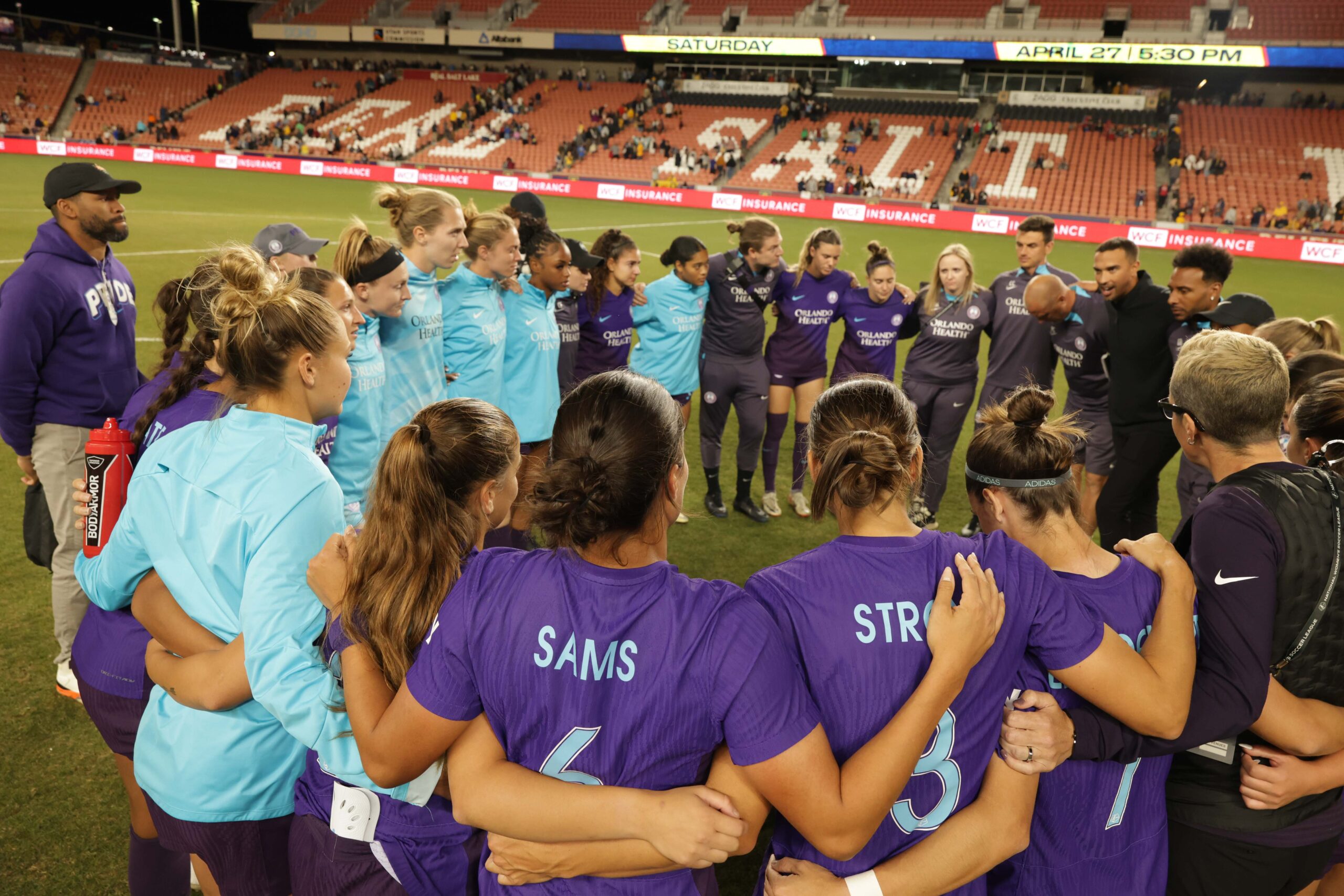
Happy Tuesday, everyone. It was another busy weekend of Orlando soccer, and things aren’t going to slow down anytime soon. May is an absolutely packed month for all three teams, and the games will be coming thick and fast. We have a lot to discuss this morning, so let’s jump into the links.
Luana Diagnosed with Hodgkin’s Lymphoma
This week started off with some very sad news, as the Orlando Pride announced on Monday that midfielder Luana has been placed on the Season-Ending Injury list as a result of her being diagnosed with Hodgkin’s lymphoma. The Brazilian international is starting chemotherapy treatments with the Orlando Health Cancer Institute. In a statement, Luana thanked both the Brazilian National Team and the Pride for the support she’s been receiving. Seb Hines and Rafaelle also spoke about how the team has been supporting Luana.
San Diego Reportedly Nears Deal for Chucky Lozano
The Athletic’s Tom Bogert has reported that San Diego FC is in advanced talks to sign Chucky Lozano ($) from PSV Eindhoven. The Dutch team is expected to receive a transfer fee in the area of $12 million, and Lozano would likely be the highest-profile player for the expansion team ahead of its maiden Major League Soccer season in 2025. While nothing is official, San Diego is said to be hopeful of getting a deal done before Copa America kicks off this summer.
U.S. and Mexico Withdraw 2027 Women’s World Cup Bid
The United States and Mexico have announced their decision to withdraw a joint bid for the 2027 Women’s World Cup, and instead focus on bidding for the 2031 edition of the tournament. The bid had made it to the final three of the selection process, in addition to a bid from Brazil and a joint effort from Belgium, Germany, and the Netherlands. U.S. Soccer President Cindy Parlowe Cone cited a desire to have more time to prepare while also having the opportunity to learn from the experience of the joint effort of hosting the 2026 World Cup. As far as who will host in 2027, the decision will be made on May 17, with Germany having hosted a Women’s World Cup back in 2011, while Brazil would be the first South American nation to host the tournament.
English Premier League Approves Spending Cap
Premier League teams took the first step towards implementing a spending cap on Monday. While a final vote is still needed to ratify the proposed changes, Monday’s vote gave the green light to start the legal and economic studies needed to change to a spending cap model. The proposed cap would be based on how much the lowest earning Premier League team earns from television rights, and could be implemented for the 2025-2026 season. There were 16 teams that voted in favor of continuing the process of moving towards a salary cap, while Chelsea abstained from voting, and Manchester United, Manchester City, and Aston Villa voted against the motion.
Free Kicks
- The Pride have risen to third in CBSsports.com’s NWSL power rankings.
- Meanwhile, Orlando City is down to 20th in ESPN.com’s MLS power rankings.
- There are a number of Americans playing in midweek games, so make sure you have everything marked down on your calendar.
- Speaking of Americans, Jesse Marsch has been linked with South Korea’s managerial opening.
- Ryan Reynolds and Rob McElhenny have purchased a minority stake in Necaxa.
That does it for me this morning. Vamos Orlando!
-
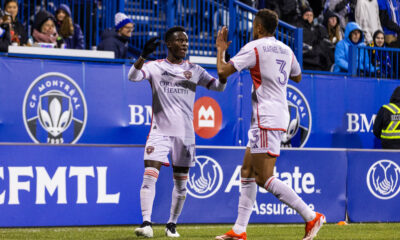
 Orlando City1 week ago
Orlando City1 week agoOrlando City vs. CF Montreal: Player Grades and Man of the Match
-
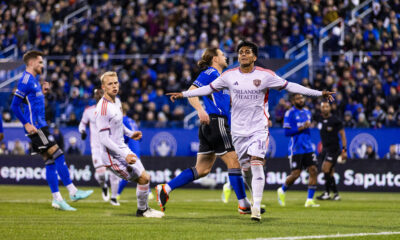
 Orlando City1 week ago
Orlando City1 week agoOrlando City vs. CF Montreal: Five Takeaways
-
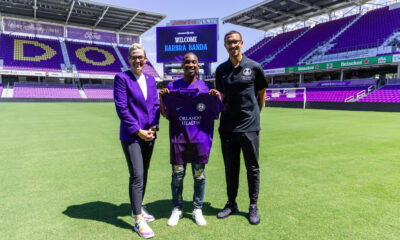
 Lion Links2 weeks ago
Lion Links2 weeks agoLion Links: 4/17/24
-
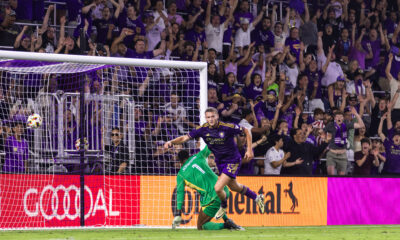
 Orlando City3 days ago
Orlando City3 days agoOrlando City vs. Toronto FC: Five Takeaways
-
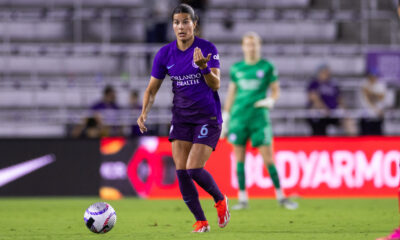
 Orlando Pride2 weeks ago
Orlando Pride2 weeks agoOrlando Pride vs. San Diego Wave FC: Preview, How to Watch, TV Info, Live Stream, Lineups, Match Thread, and More
-
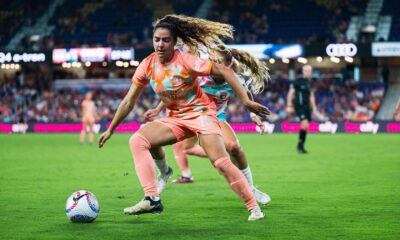
 Orlando Pride2 weeks ago
Orlando Pride2 weeks agoOrlando Pride vs. San Diego Wave FC: Final Score 1-0 as Pride Continue Unbeaten Run
-
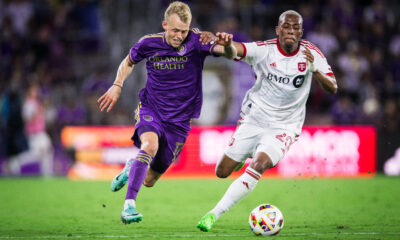
 Orlando City4 days ago
Orlando City4 days agoOrlando City vs. Toronto FC: Final Score 2-1 as Lions Blow Late Lead at Home
-
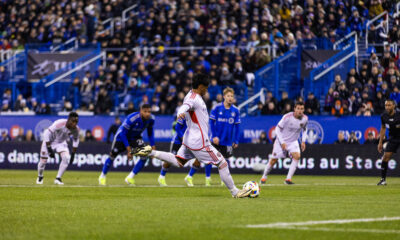
 Orlando City2 weeks ago
Orlando City2 weeks agoOrlando City vs. CF Montreal: Final Score 2-2 as Lions’ Transition Defense Fails in Road Draw


